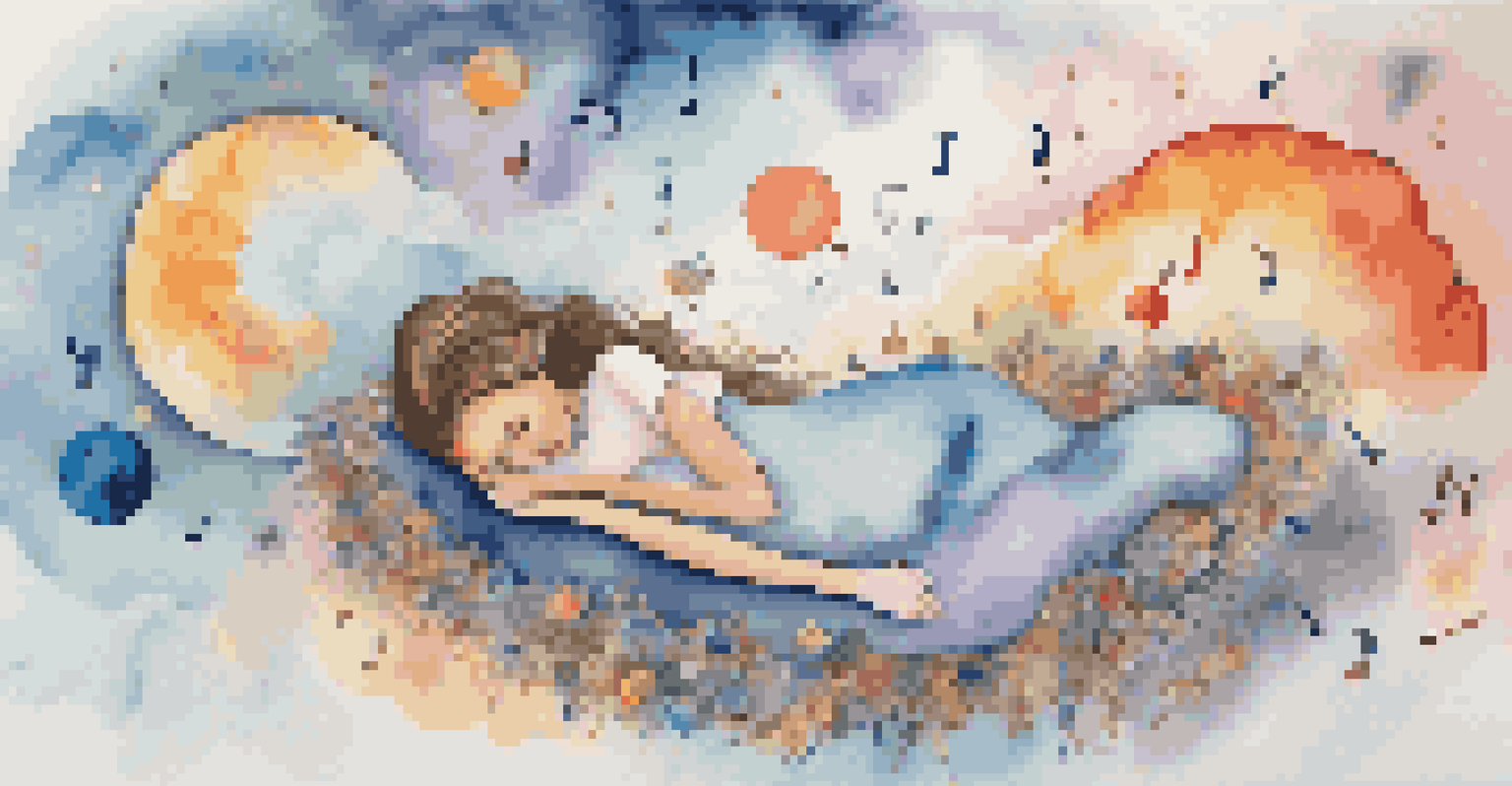The Impact of Sleep Quality on Creativity and Mental Innovation

Understanding Sleep Quality: The Foundation for Creativity
Sleep quality refers to how well we sleep, encompassing factors like duration, depth, and restfulness. When we experience good sleep quality, our minds are better equipped for creative thinking and problem-solving. Conversely, poor sleep can leave us feeling foggy and uninspired, making it harder to tap into our innovative potential.
Sleep is the best meditation.
Imagine trying to paint a masterpiece on a canvas that’s constantly moving; that’s what poor sleep does to our minds. It disrupts our cognitive processes, making it challenging to connect different ideas and concepts. The brain's ability to synthesize information is significantly hampered, leading to a lack of fresh ideas and innovative solutions.
In essence, sleep quality acts as a foundation for creativity. Just as a solid base is essential for a well-constructed building, quality sleep supports our mental architecture, allowing creativity to flourish.
The Science Behind Sleep and Creativity
Numerous studies have demonstrated the intricate relationship between sleep and creative thought. Research shows that REM (Rapid Eye Movement) sleep, a phase where dreaming occurs, plays a crucial role in problem-solving and creative insights. During this stage, our brain processes information and makes connections that might not be apparent when we’re awake.

One fascinating example is the way musicians and artists often report breakthroughs during or after sleep. It’s as if their minds continue to work on their creative challenges overnight, leading to eureka moments upon waking. This phenomenon highlights how sleep acts as a catalyst for innovation.
Sleep Quality Fuels Creativity
Good sleep enhances our cognitive processes, allowing for clearer thinking and innovative ideas.
Understanding this science empowers us to prioritize sleep as a vital tool for enhancing creativity. Instead of viewing sleep as a luxury, we should see it as a necessity for unlocking our creative potential.
Negative Effects of Sleep Deprivation on Innovation
When we skimp on sleep, we’re not just sacrificing rest; we’re also undermining our ability to innovate. Sleep deprivation can lead to cognitive impairments, including reduced attention span, memory issues, and poor decision-making. These cognitive deficits can stifle our creative processes and limit our capacity to come up with original ideas.
Dreams are the touchstones of our character.
Think of sleep deprivation as a fog that blocks the sunlight from reaching a garden. Just as plants need sunlight to thrive, our brains need quality sleep to nourish creativity. Without it, we may find ourselves stuck in a cycle of uninspired thinking, unable to break free and explore new possibilities.
Ultimately, the negative effects of sleep deprivation extend beyond just feeling tired. They can have lasting impacts on our ability to innovate, making it crucial to prioritize restorative sleep in our lives.
How Sleep Enhances Problem-Solving Abilities
Quality sleep not only fuels creativity but also boosts our problem-solving skills. When we’re well-rested, our brains can think more clearly and approach challenges from different angles. This heightened cognitive flexibility allows us to devise innovative solutions and tackle complex problems more effectively.
Consider a time when you faced a difficult decision and felt overwhelmed. After a good night’s sleep, the solution may have seemed clearer, almost like a light bulb going off in your mind. This is the power of sleep in enhancing our cognitive abilities and enabling us to find creative resolutions.
Sleep Deprivation Hinders Innovation
Lack of sleep leads to cognitive impairments that stifle creativity and problem-solving abilities.
In short, sleep acts as a reset button for our minds, allowing us to approach problems with renewed clarity and creativity. It’s a reminder that sometimes, stepping back and resting can lead to the most profound insights.
The Role of Dreams in Creative Thinking
Dreams can be a treasure trove of creative ideas, providing insights and inspiration that we might not access during our waking hours. Many artists and inventors have credited their dreams with sparking some of their most famous works. This connection between dreams and creativity underscores the importance of REM sleep in the creative process.
For instance, the famous chemist August Kekulé reportedly discovered the structure of benzene after dreaming of a snake biting its own tail. Such anecdotes highlight how our subconscious mind can work through problems while we sleep, leading to innovative breakthroughs.
Embracing our dreams as sources of inspiration can enhance our creative endeavors. By acknowledging the role of dreams in our creative process, we can harness their potential to fuel our innovative thinking.
Practical Tips for Improving Sleep Quality
Improving sleep quality doesn’t have to be daunting. Simple changes in our daily routines can lead to more restorative rest. For example, establishing a regular sleep schedule, creating a calming bedtime routine, and limiting screen time before bed can significantly enhance sleep quality.
Imagine treating your sleep like a valuable asset, investing time and effort into nurturing it. Just as you would care for a garden, tending to your sleep habits can cultivate an environment where creativity can thrive. Small adjustments, like dimming the lights or reading a book, can signal your body that it's time to wind down.
Dreams Spark Creative Insights
Our dreams can provide valuable inspiration and solutions that we may not access while awake.
Ultimately, prioritizing sleep is a proactive step towards enhancing creativity and innovation. By making sleep quality a priority, we can open the doors to a more inspired and imaginative mindset.
Conclusion: Sleep as a Catalyst for Creativity
In conclusion, the impact of sleep quality on creativity and mental innovation cannot be overstated. Quality sleep acts as a foundation for our cognitive processes, enhancing our ability to think creatively and solve problems. When we prioritize restorative sleep, we’re not only improving our overall well-being but also unlocking our full creative potential.
As we’ve explored, the connection between sleep and creativity is multi-faceted, involving science, personal anecdotes, and practical strategies. Recognizing the importance of sleep can empower us to make conscious choices that foster our innovative thinking.

So, the next time you’re feeling stuck creatively, consider taking a break and getting some rest. You might just wake up with the ideas you’ve been searching for, proving that sleep truly is a catalyst for creativity.